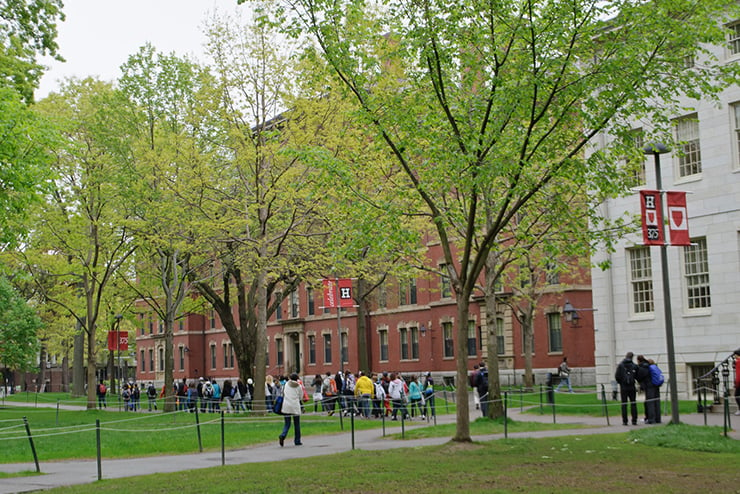This week, John Hinderaker at Powerline linked approvingly to an editorial in The Wall Street Journal produced by Charlie Covit, a Jewish freshman at Harvard. According to Covit, “The crisis facing Harvard’s Jewish community hasn’t gone way. A zealous hatred of Israel has swept our campus thinly veiling an epidemic of anti-Semitism.” The solution proposed by the writer, which Powerline seems strongly to endorse, is as follows: “Harvard’s new administration can take a simple step to address this by adopting the International Holocaust Remembrance alliance’s definition of antisemitism, which includes anti-Zionism. Let there be no doubt that students who declare themselves anti-Zionists are calling for the displacement or worse of half the world’s Jewish population.”
Let’s be clear about what Covit, and presumably, Hinderaker are calling for. Unless I’m mistaken, they are trying to treat critics of Zionism as anti-Semites and are urging that universities adopt this semantic practice. But how far should we go in pushing this? For example, if I dared to notice that early Zionists held racialist theories similar to those of other racial nationalists, should I be banned from Harvard as a threat to world Jewry for pointing out this fact? What about disseminating the work of Benny Morris and others who document the expulsion of hundreds of thousands of Arabs from what is now the territory of Israel, starting in the spring of 1948? If I refer to this fact, am I advocating that half of the world’s Jewish population be displaced?
Please note that I believe Israel has at least as much of a right to exist as other nations, which in most cases also expelled earlier inhabitants. And having been in Israel several times, I’ve noticed how responsive its government is to its voters, and how openly its citizens express their views about everything under the sun. Indeed, I wish such tolerance still existed in the now-wokeified United States. I further believe that Israelis have a right to defend themselves against enemies who are, admittedly, trying to wipe them out; and I respect the way they place their own right to survival first, “world opinion” be damned.
What I don’t admire is the intolerant Zionist nationalism consuming the American conservative establishment. I was first given a bitter taste of this nuttiness in the late 1980s when prominent neoconservatives kept me from obtaining a graduate professorship at Catholic University of America. My critics then attacked me to the university administration on the grounds that I was “not entirely reliable on Israel.” This charge unfortunately worked, especially since the university that had been considering me for a position did not want to be stigmatized as anti-Semitic, even by association. And even if I were anti-Israeli, why should this have prevented me from teaching Aristotle, Hobbes, or Hegel in a political theory course? The attack leveled on me by “conservatives” happened after they had been told about an article of mine that supposedly “belittled” Israel. In fact, my commentary contrasted the neoconservatives’ passionate attachment to Israel with the nationalist realism of Israel’s Likud government.
Covit’s plea for isolating anti-Zionists as dangerous bigots opened other questions for me. If universities are supposed to go after anti-Zionists, why shouldn’t we do the same to students or faculty who badmouth the United States? Why must Harvard impose special punishment on critics of Zionism and/or Israel that it doesn’t demand of those who make verbal attacks on other Western countries?
And now that I’m on a tear, perhaps I might ask: Why didn’t the Jewish students at Harvard object when their professors railed against white people as systemic racists or when they slimed Christians with total impunity? It’s a little late in the day to be discovering what cesspools of intolerance American universities have become. Would those who are now raging against Harvard’s anti-Zionist intolerance even care if this madness had not reached its present target? Why have those who have allowed other politically unprotected groups to come under fire from the academic left, waited until now to be offended?
Yes, I know that I shouldn’t paint with too broad a brush and that people often wait until their own ox is gored before complaining. But having listened to Jewish parents for many decades telling their kids to agree with what they are told as long as they make it into an Ivy league school, I am understandably annoyed by this raging, selective reaction to the inevitable result of going along with evil until the Hamas attack in October.
Some Jews, like other Americans, woke up decades ago to the poison being pumped into our young by American universities. But most did not, and demanding now that others be stripped of their freedoms to satisfy the concerns about anti-Semitism seems to me a bit much. If students of Jewish or any other ethnicity are threatened with physical violence, then call in the police and expel the threatening offender. Suspending freedom of speech to please those who don’t want to hear anti-Zionist sounds is not the proper response.

Leave a Reply